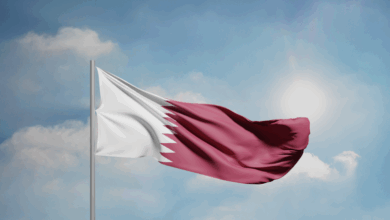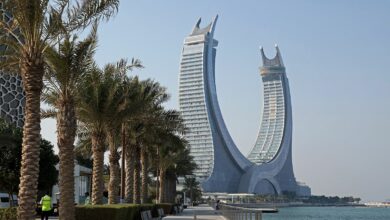The rich Gulf state of Qatar has once again made a sizeable dollar deposit into Egypt’s central bank, bringing its total to US$5 billion.
Late Tuesday, Qatari Prime Minister Hamad Bin Jassim al-Thani said in a conference, alongside his Egyptian counterpart Hesham Qandil, that the Gulf state would deposit another $2 billion in addition to an outright grant of $500 million, similar to a package of the same value deposited after the 25 January uprising.
The total $5 billion in Qatari deposits are meant to replenish Egypt’s depleted foreign reserves, which now hover around $15 billion after falling by more than half in two years — money which went to supporting the value of the Egyptian pound against the dollar.
After sliding more than 5 percent in just the past two weeks, the pound reached 6.4797 on Wednesday, during the newly introduced Central Bank auction of dollars. This new currency regime is being implemented for the second week as the Central Bank struggles to stave off a rush on dollars in the local market that’s further weakening the pound.
Meanwhile, Egypt resumed last week negotiations with the International Monetary Fund on a long-awaited $4.8 billion loan, the final approval on which was delayed for a month from the initial schedule of 19 December due to the suspension of a batch of new controversial taxes.
But despite the new dollar auctions as well as Qatar’s fresh deposit, the pound slid further on Thursday to a record low of LE6.5099.
The technicalities of the financial transaction are a bit confusing, as the money is neither a loan nor a direct investment into a project or a fund.
Moustafa Bassiouny, an economist at The Signet Institute, a Cairo-based think tank focusing on MENA economies, explains: “Basically what happens is that Qatar takes out money from its own accounts and deposits it into the Central Bank. In that sense, it is not a loan.
“The Central Bank goes on to use this money, which is a liability, as it does with its other liabilities in investing it (as with a commercial bank using up customers deposits to give out loans). By doing so, they transfer an almost equivalent amount to the asset side, and this is what gets recorded as the reserves.”
Many criticize the financial maneuver for giving Qatar economic leverage, and in turn, political influence, over Egypt.
“By virtue of the money being a deposit, the Qataris … [can] command a much lower interest rate (reportedly around 1 percent) as opposed to normal Egyptian Treasury borrowing in USD (which now costs around 6-7 percent),” says Bassiouny.
“However, a deposit, by definition, is much less sticky than a loan — you can withdraw your money from the bank at virtually no cost, but it’s somewhat harder for a bank to recall a loan it gave out. So, in theory, Qatar can demand its money back at any moment, and thus, practically, this gives Qatar, in this specific context, political leverage over Egypt.”
During the conference, Thani said that the grants and deposits have arrived with the Central Bank. "Some of the final details with the deposits are being worked on with the technical people, but the amount is there," he said.
Qandil says that investments being planned by Qatar in Egypt will reach $18 billion, including a mega tourism project in East Port Said worth $10 billion and a similar one in the Red Sea worth $8 billion.
On the economic side, the market did not react very positively to news of the deposits, a clear signal that a more sustainable strategy is need to boost reserves, mainly by attracting tourism and foreign direct investment.
Mohammed Abu Basha, an economist at regional investment firm EFG-Hermes, tells Egypt Independent that the "[Central Bank's] auction did not show a big difference from the auctions of the last few days. In [Wednesday’s] auction, the pound's value weakened 0.5 percent…the same rate of decline as the previous three auctions.”
Increasing political influence
Observers say Qatar’s investments and financial dealings are part of the Gulf country’s efforts to widen its political and economic influence in countries that witnessed a wave of political change, with similar plans in the works for Tunisia and Libya.
On the other hand, the visit of the Qatari PM came amid tensing ties between Egypt’s ruling Brotherhood regime and the United Arab Emirates, which has detained 11 Egyptians reportedly for having ties with the Muslim Brotherhood and attempting to recruit Emirati nationals. Facing a deadlock and a rejection of calls to release the detainees, Egypt has requested the intervention of Qatar, with which it has palpably warmer ties on many levels.
A high-profile Egyptian delegation including Essam al-Haddad, a leading Brotherhood figure and President Mohamed Morsy’s Assistant for Foreign Affairs, and head of Intelligence Mohamed Raafat Shehata last week, headed to the UAE but came back empty-handed.
Author and Reuters correspondent Andrew Hammond, who has written extensively on Gulf political affairs, says Qatar has been a major supporter of Brotherhood-linked Islamists across the region.
“Qatar's leaders appears to have become convinced that the Islamists are the movement of the future who can ensure stability in the Arab region — an idea they are trying to sell to Washington,” he says. Unlike the UAE who was frightened by the surprising fall of Mubarak regime, “Qatar on the other hand, welcomed it, as we all saw with the way Al Jazeera tried to steer the Egyptian uprising,” he adds.
Thani denied in the conference allegations of Qatari hegemony over the Egyptian political and economic affair, describing it as a “silly joke.”
“Egypt is a big country with its [huge] human and economic value that cannot be controlled by any other state,” he said.
He added such allegations were reiterated before for political reasons, for public consumption inside Egypt.
“We in Qatar will never make a certain political faction succeed even if the entire Qatari population itself voted in the elections,” he argued.
David Wearing, SOAS University PhD researcher on UK foreign policy in MENA countries as well as a Guardian commentator, agrees. He says Qatar’s view of the Arab Spring seems to be different from the rest of GCC countries.
“It sees the rise of the Muslim Brotherhood as more an opportunity than a threat. See the pledge of major cash for Hamas-run Gaza, for example. Qatar can seek to exploit investment opportunities in some temporarily weak economies, such as Tunisia,” he tells Egypt Independent.
“It can translate that into political influence in those countries. And by establishing those ties, it can then mediate between the MB and other parties (like the UAE in this dispute, but also perhaps the West in other situations), thus extending its influence further,” he adds.




